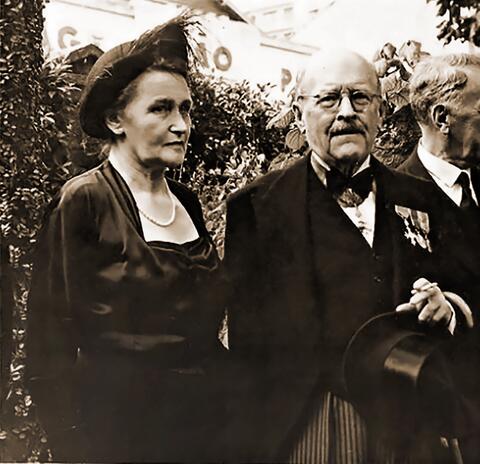Diplomatic Responses: The Smallbones Scheme
At a Glance
Language
English — USSubject
- History
- The Holocaust
World leaders responded to the events of Kristallnacht from a distance, but their ambassadors, consuls, and other diplomats had to deal firsthand with the aftermath. Most carried out the wishes of their superiors without complaint, but others refused to do so. When Feng-Shan Ho, the Chinese consul general in Vienna, was ordered to stop issuing visas to China, he ignored the order and continued to issue them to anyone who asked for one. He was aware that Jews could leave Germany only if they had a visa to enter another nation.
Robert Smallbones, the British consul-general in Frankfurt, Germany, also tried to help as many Jews as possible, but he went about it in a different way:

Robert Smallbones, a British diplomat who created a visa program that enabled Jews to escape Nazi-occupied Germany, and his wife, Inge.
On Kristallnacht, I happened to be in London. Inga (my grandmother) telephoned me the next morning [from Frankfurt] that hundreds of Jews had besieged the consulate and that she had allowed all who sought refuge to spend the night as best they could in the house. She, Irene (my mother) and the servants had been up all night supplying them with food—and trying to console them. She asked me to do something to help. The Home Office is the department dealing with immigration and I went to see a senior official there who dealt with this question. He had seen in the newspapers what was going on in Germany and I asked him what they proposed doing about it. He replied: “Nothing. What can we do? We cannot let them come and cause unemployment amongst our own people. Have you got an idea?” I said that I had, and he summoned a few of his colleagues. 1
The consul’s idea—later known as the Smallbones Scheme—was based on US immigration laws. The Immigration Act of 1924 limited the number of newcomers allowed entry into the United States each year. The government set the maximum number, or quota, of immigration visas issued to individuals from each country each year; the number was 2% of the total number of people from that particular country who had lived in the United States in 1890. According to that law, the United States could allow no more than 27,000 immigrants from Germany each year, even though 309,000 German, Austrian, and Czech Jews applied for visas in the first six months of 1939.
Smallbones knew that Britain’s immigration laws were more flexible and could be expanded in an emergency, and an emergency clearly existed in Germany. Smallbones asked the Home Office to provide a temporary haven for Jews who would eventually go to the United States under the quota system. They could wait in Britain for their turn to enter the United States. After a brief discussion, officials in the Home Office agreed that Smallbones’s plan had potential. They asked him to work out the details. According to Smallbones,
I telephoned to Otto Schiff of the Jewish Relief organization and asked him to lunch at the Savoy Hotel with some of his collaborators. We drafted [a document] to be given by the applicant for the British visa not to seek employment in the United Kingdom and a guarantee to be given by a bank or a responsible person in the United Kingdom that he would not become a charge on public funds. We also worked out the details of the procedure with the American consular authorities in Germany to make sure that the applicant would eventually be admitted to the United States of America. I submitted this at once to the Home Office and was authorized that same afternoon to introduce this system in my district. The Foreign Office was to be asked to send corresponding instructions to the Passport Control Officer at Berlin and to all my colleagues in Germany. 2
Smallbones returned to Frankfurt that night; the next morning, he went to see the head of the local Gestapo to arrange for the release of Jews from concentration camps based on the promise of a British visa.
[The local head of the Gestapo] said they could be released if, in addition, they had all their German emigration papers in order, passports, exit visas, certificates from the inland revenue that they had paid income and other taxes, etc. I replied that this was an impossible condition as they could not themselves attend to these formalities while locked up and as the Jewish lawyers who could act for them were also interned; few Aryan lawyers would risk importuning the authorities on their behalf. We had a fierce argument and I started shouting in the proper German manner. When I jumped up and said that my proposal to help Germany to be rid of some of their Jews was off, and that I would report by telegram to my Government, the Gestapo bully collapsed and we made an agreement in the sense desired by me. I know of no case in which a promise of a visa given by me did not lead to the immediate release of the interned. 3
Every one of the visas Smallbones issued had to be typed and then signed by him or a member of his staff.
I usually worked about eighteen hours a day. The longest stretch I remember was from early in the morning until midnight when I fell asleep for a few minutes on my desk. . . . I went to bed. . . . After two hours sleep my conscience pricked me. The feeling was horrible that there were people in a concentration camp whom I could get out and I was comfortable in bed. . . . I returned to my desk and stayed there until the next midnight. I had a nervous breakdown after a few months. . . . The last straw that broke my back was the case of a person who died in a concentration camp because one of my staff had failed to get my signature and to dispatch the promise of a visa which was in order.
Smallbones issued visas until September 3, 1939, the day the British declared war on Germany. After his return to Britain, he learned that about 48,000 individuals had benefited from the Smallbones Scheme and that another 50,000 cases had been under consideration when the war broke out. Few people knew of Smallbones’s efforts. British officials feared an outcry if the public knew how many people had been admitted to the country under the scheme. Aware of feelings of both antisemitism and isolationism in Britain, they insisted that Smallbones and others involved in the scheme keep it a secret. It was not revealed until 2009.
Connection Questions
- How were Robert Smallbones and Feng-Shan Ho able to make a difference? What was the role of ingenuity? What was the role of circumstance? What other factors played a role in their choices and in the results of those choices?
- What does Britain’s insistence on secrecy reveal about public opinion of the refugee crisis in that country at the time?
- Does a nation’s failure to help mean that an individual from that nation also has no responsibility? What can an individual accomplish that a nation may not be able to? Are there any issues in the world today that individuals are trying to address despite the unwillingness or inability of governments to respond?
- 1British Foreign and Commonwealth Office, “Commemorating Diplomats” (2008), 19–20, accessed April 26, 2016.
- 2British Foreign and Commonwealth Office, “Commemorating Diplomats” (2008), 21, accessed April 26, 2016.
- 3British Foreign and Commonwealth Office, “Commemorating Diplomats” (2008), 21–22, accessed April 26, 2016.
How to Cite This Reading
Facing History & Ourselves, "Diplomatic Responses: The Smallbones Scheme," last updated August 2, 2016.








